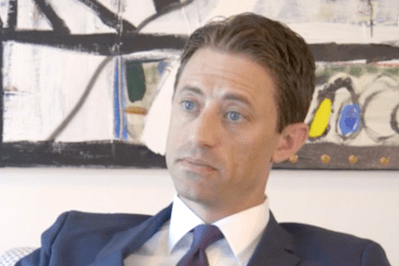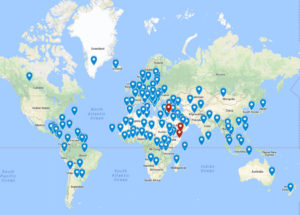Truthdigger of the Week: Daniel Jones, the Senate’s Chief Investigator Into Torture by the CIA
Jones—who became a target of the CIA because he searched for the truth—this week spoke out for the first time. He has been a key force in the disclosure of a scandal that one senator compared to Watergate.
Every week the Truthdig editorial staff selects a Truthdigger of the Week, a group or person worthy of recognition for speaking truth to power, breaking the story or blowing the whistle. It is not a lifetime achievement award. Rather, we’re looking for newsmakers whose actions in a given week are worth celebrating.
In 2009, after long public outrage over allegations of torture and a New York Times report that a senior CIA official had destroyed videotapes that showed brutal interrogations, the U.S. Senate opened an investigation into the CIA’s post-9/11 detention and interrogation program, conducted under the administration of George W. Bush.
The CIA had told Bush and the public that what it called “enhanced interrogation techniques”—among them waterboarding, prolonged standing and sleep deprivation—were necessary to protect national security.
With the cooperation of the CIA, Senate investigators began their work in the basement of a CIA building in Virginia. They were told that the computers they were given were not accessible by the CIA. In 2014, they concluded in a 525-page public summary of findings that the CIA had lied with abandon: The truth was torture didn’t beget information that could be used to thwart future attacks, interrogators’ methods were far worse than officials admitted, and the agency had routinely covered up its activities and impeded efforts to oversee them. The classified version of the report runs to 6,700 pages.
It also emerged that the CIA had conducted a secret counterinvestigation into the Senate investigators. In other words, the U.S. government’s intelligence and national security apparatus spied on Congress.
This week, the man who led the Senate investigation and became the primary target of the CIA’s investigation, spoke out for the first time. Daniel Jones, a former FBI counterterrorism analyst, spent six years directing the Senate’s inquiry, which involved the review of 6.3 million pages of internal CIA documents. The public version of the study exceeded 500 pages.
In 2010, Jones and his team came across the results of a parallel inquiry the CIA conducted into itself to gain an understanding of its own use of torture. The authors of that document—which Jones dubbed the “Panetta Review,” after former CIA Director Leon Panetta—concluded that “the CIA misrepresented the success of the program to the president of the United States, the Congress and the United States people,” said Jones.
The discovery prompted Jones to take drastic action.
“The CIA has a history of destroying its documents, destroying its own records,” Jones told The Guardian. “And this was a record that was so incongruent with the CIA’s response that they gave to us, we felt a need to preserve it.
“To preserve that document … we decided to bring back a portion of that document to the Senate Intelligence Committee.” In violation of the committee’s agreement with the CIA, one night after midnight in the summer of 2013 Jones printed out pages he considered to be crucial to the Senate’s investigation, placed them in a messenger bag, drove to his office on Capitol Hill and placed them in a safe.
Before the committee made its findings public in December 2014, CIA Director John Brennan announced that the CIA had searched the Senate committee’s computers and that it would conduct a deeper investigation into the activities of the investigators and associated Senate staffers. Agency officials accessed Jones’ work and reconstructed his emails.
As Spencer Ackerman, the journalist with whom Jones spoke, wrote in The Guardian, the revelation sparked “an unprecedented clash between the agency and its legislative overseers on Capitol Hill.” The battle saw each side call for the Justice Department to pursue a criminal investigation into the other, and Jones and his report were condemned by the CIA, denounced by committee Republicans and, it appears, abandoned by President Barack Obama.
Jones’ work culminated in the passage of an anti-torture law, but it did not bring to justice the officers who tortured and the officials who tried to cover it up. And some of the scandal’s major figures remain untouched. “People who played a significant role in this program, who are in the report, continue to play significant roles in sensitive programs at the agency,” Jones said. “To me, it’s a huge lost opportunity.
“This is John Brennan’s CIA, Obama’s CIA,” he continued. “[Agency leaders are] providing inaccurate information to the president of the United States in the present day.”
Mark Udall, a former Democratic senator on the committee, has added: “The deeper, more endemic problem lies in a CIA, assisted by a White House, that continues to try to cover up the truth. I worry that an agency that has yet to acknowledge these mistakes could continue to make them under a new administration.”
Jones now works as a policy consultant in Washington, D.C. Dianne Feinstein, the Senate inquiry committee’s top Democrat, called the CIA’s spying on Congress a constitutional crisis, one that would seem to rise at least to the level of the 1970s Watergate affair. But as The Guardian’s reporting makes clear, Obama and his Justice Department aren’t interested.
Daniel Jones is our Truthdigger of the Week.
Your support matters…Independent journalism is under threat and overshadowed by heavily funded mainstream media.
You can help level the playing field. Become a member.
Your tax-deductible contribution keeps us digging beneath the headlines to give you thought-provoking, investigative reporting and analysis that unearths what's really happening- without compromise.
Give today to support our courageous, independent journalists.






You need to be a supporter to comment.
There are currently no responses to this article.
Be the first to respond.